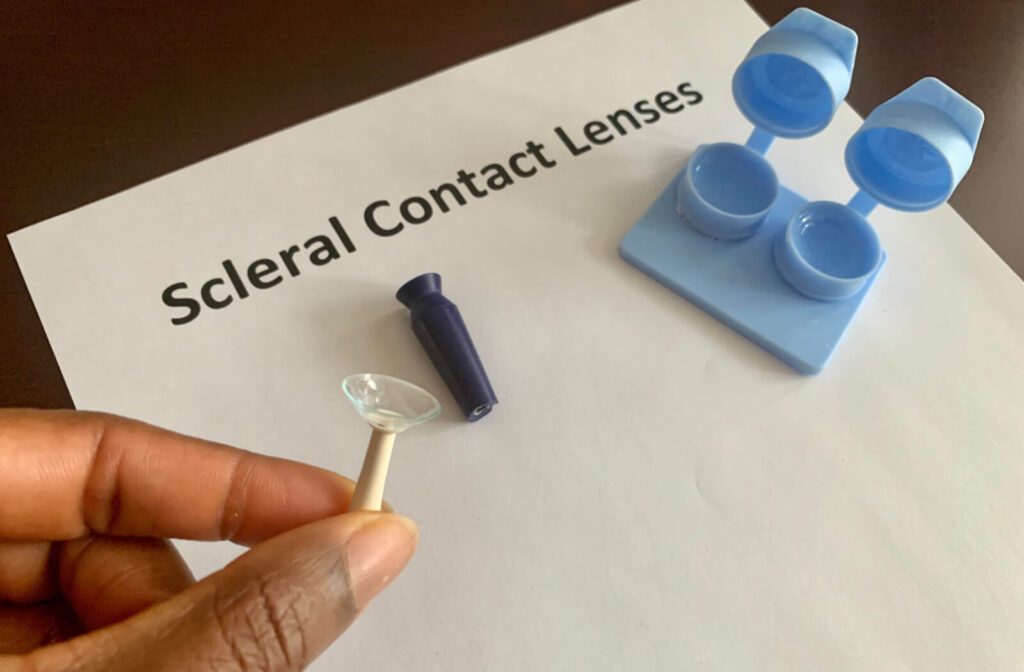Table of Contents

Introduction
Dry eye can be a challenging, chronic issue to manage. It can make everyday tasks more difficult, and finding relief may be the first thing on your mind. Dry eye can also make it difficult to wear contact lenses, but the good news is that your optometrist can help you find a solution.
Contact lens technology has come a long way. There are accessible options available for people who have dry eyes but still want to wear contact lenses. Soft and rigid gas-permeable lenses and specialty contacts like scleral and ortho-k can also help manage dry eye.
Let’s explore what types of contact lenses are the best for dry eyes and how they work.
A Closer Look at Dry Eye
Dry eye disease can occur when your eyes don’t produce enough tears or those tears evaporate too quickly. Dry eye may be caused by an inability of the tear film to lubricate the eye properly.
Your tear film consists of 3 layers:
- The oily outer layer from your meibomian glands
- The watery middle layer from your lacrimal glands
- The inner mucus layer on the conjunctiva of your eye
Dry eyes can occur when the glands that produce these elements of your tears are not functioning properly or become inflamed.
Inflammation caused by an interruption to the tear process can also result in meibomian gland dysfunction. When this happens, the small glands in your eyelids that produce the oily layer of tears become clogged and cause instability in the tear film.
Dry Eye Symptoms
Dry eye symptoms can vary, and the best way to get to the bottom of your dry eye symptoms is to visit your eye doctor for a comprehensive checkup.
Some common signs and symptoms of dry eye can include:
- Blurry vision
- Gritty eyes
- Feeling like something is stuck in your eye
- Excess watering
- Light sensitivity
- Burning or stinging
- Stringy mucus
What Causes Dry Eyes?
Dry eye is an often chronic and dynamic condition, meaning it can have many different causes. Risk factors can include:
- Age—people over 65 are more likely to experience dry eye symptoms
- Environmental conditions like exposure to smoke, wind, or dry climates
- Medications that reduce tear production
- Hormonal changes
- Medical conditions
Your optometrist assesses your overall eye health, including discussing your lifestyle to get to the bottom of your dry eye symptoms and developing a treatment plan.
Dry Eye-Friendly Contact Lenses
Contact lenses generally fall under 2 different categories: soft and rigid gas permeable (RGP). Within these 2 categories are specialty contact lenses that can help address unique visual needs, like dry eye.
Soft Contact Lenses
Soft contact lenses come in many choices, including daily disposables, biweekly, and monthly contact varieties. These lenses are made of soft, flexible plastics that allow oxygen to flow to the cornea.
Soft contacts are one option for people with dry eyes. A fresh set of daily disposable lenses can help limit the build-up of bacteria and allergens that could irritate your eyes. Daily soft contacts also usually feature a wetting agent that can provide extra moisture for your eyes.

Rigid Gas Permeable (RGP) Lenses
Rigid gas permeable (RGP) contact lenses are durable and resistant to deposit build-up. These lenses may not be as comfortable as soft contacts initially, and it may take some time to get used to them. RGP lens options include specialty contacts that can help manage dry eye disease.
Scleral Lenses
Scleral contact lenses are a specialty type of RGP contact lens that avoid touching the cornea of the eye to avoid irritation. Scleral lenses can be an excellent option for patients who may not be able to wear contacts due to eye issues such as dry eye and keratoconus.
Scleral contact lenses differ from traditional contacts. These lenses are larger and rest on the sclera, or white of your eyes. Scleral lenses vault over the cornea and allow for more space, providing extra breathability.
Scleral contacts also create a fluid reservoir between the lens and the eye to keep your eyes hydrated.
Ortho-K Lenses
Ortho-k (orthokeratology) lenses use specially designed, custom-fitted RGP contact lenses to reshape your cornea overnight while you sleep, providing you with clearer vision during the day.
While being a primary treatment option for myopia management, ortho-k lenses can also be an effective way to manage dry eye. Because you wear the lenses while you sleep, your eyes can feel more hydrated during the day.
Finding Your Dry Eye Solution
Your ocular health is important to preserve, and dry eyes can interfere with your comfort and productivity. If you prefer contact lenses and haven’t been able to wear them comfortably in the past, there may be specialty options available to you.
Book an appointment with our eye care professionals at Golden Vision, and we can help find the right contact lenses and dry eye solutions for you.

